RMIT University ONPS2375: Literature Review on Cannabis Plant
VerifiedAdded on 2022/08/20
|10
|2038
|10
Literature Review
AI Summary
This literature review examines the cannabis plant, focusing on its impact on brain health. The review explores the plant's psychoactive properties, specifically Δ9-tetrahydrocannabinol (Δ9-THC) and cannabidiol (CBD), and their potential benefits for neurological and neuropsychological conditions. The study highlights the therapeutic effects of cannabis in reducing symptoms of Alzheimer's, depression, and chronic pain, while also acknowledging the negative side effects such as impaired decision-making and memory issues. The review also discusses the plant's relevance in society, including the need for responsible consumption and addressing societal stigma. The author concludes by emphasizing the need for further research, particularly on the effects of cannabis on conditions such as ADHD and autism, and its potential as a cost-effective medicine for neurodegenerative and psychomotor diseases. The review also includes visual aids to enhance the understanding of the subject matter.

Running head: CANNABIS PLANT
CANNABIS PLANT
Name of the student:
Name of the university:
Author note:
CANNABIS PLANT
Name of the student:
Name of the university:
Author note:
Paraphrase This Document
Need a fresh take? Get an instant paraphrase of this document with our AI Paraphraser
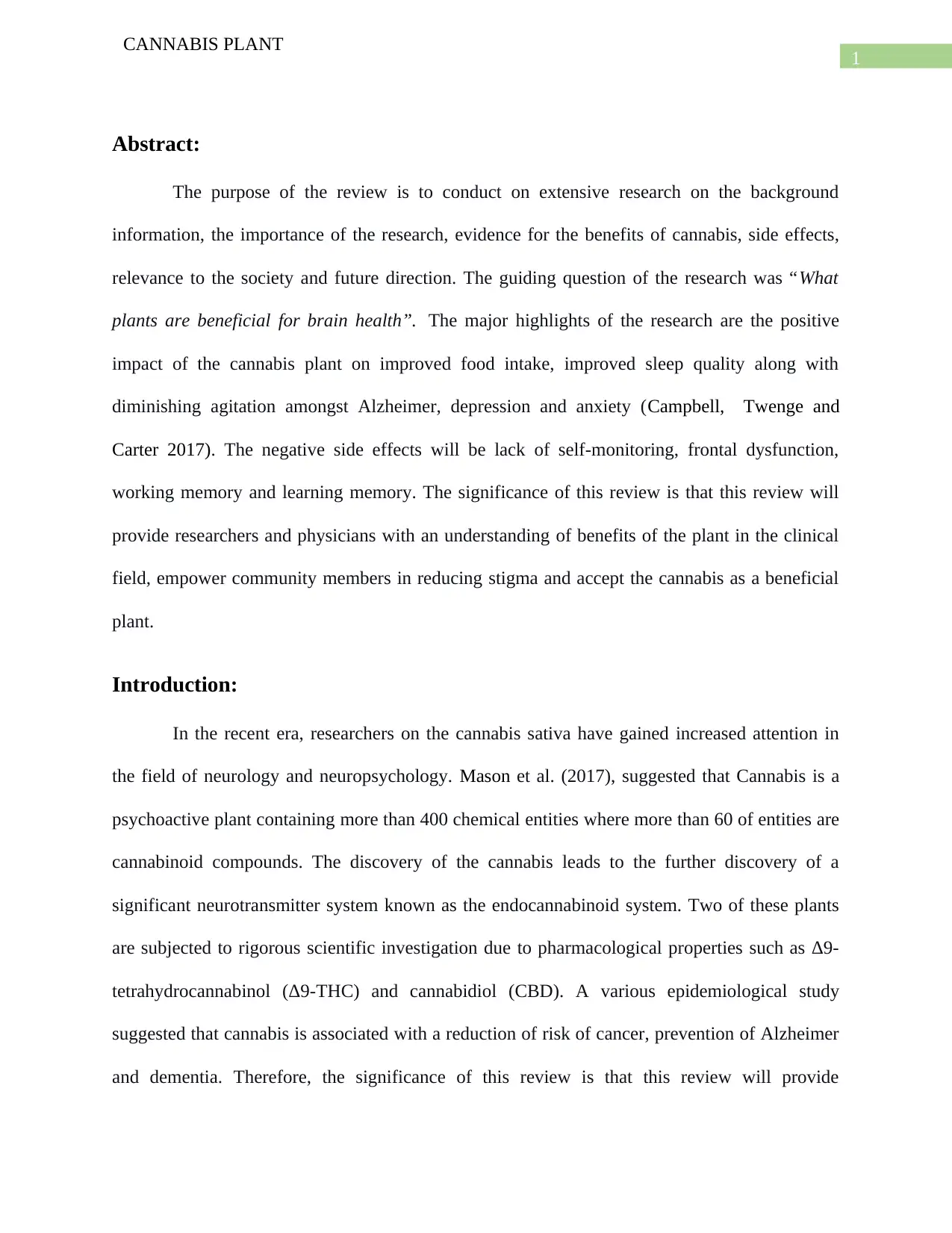
1
CANNABIS PLANT
Abstract:
The purpose of the review is to conduct on extensive research on the background
information, the importance of the research, evidence for the benefits of cannabis, side effects,
relevance to the society and future direction. The guiding question of the research was “What
plants are beneficial for brain health”. The major highlights of the research are the positive
impact of the cannabis plant on improved food intake, improved sleep quality along with
diminishing agitation amongst Alzheimer, depression and anxiety (Campbell, Twenge and
Carter 2017). The negative side effects will be lack of self-monitoring, frontal dysfunction,
working memory and learning memory. The significance of this review is that this review will
provide researchers and physicians with an understanding of benefits of the plant in the clinical
field, empower community members in reducing stigma and accept the cannabis as a beneficial
plant.
Introduction:
In the recent era, researchers on the cannabis sativa have gained increased attention in
the field of neurology and neuropsychology. Mason et al. (2017), suggested that Cannabis is a
psychoactive plant containing more than 400 chemical entities where more than 60 of entities are
cannabinoid compounds. The discovery of the cannabis leads to the further discovery of a
significant neurotransmitter system known as the endocannabinoid system. Two of these plants
are subjected to rigorous scientific investigation due to pharmacological properties such as Δ9-
tetrahydrocannabinol (Δ9-THC) and cannabidiol (CBD). A various epidemiological study
suggested that cannabis is associated with a reduction of risk of cancer, prevention of Alzheimer
and dementia. Therefore, the significance of this review is that this review will provide
CANNABIS PLANT
Abstract:
The purpose of the review is to conduct on extensive research on the background
information, the importance of the research, evidence for the benefits of cannabis, side effects,
relevance to the society and future direction. The guiding question of the research was “What
plants are beneficial for brain health”. The major highlights of the research are the positive
impact of the cannabis plant on improved food intake, improved sleep quality along with
diminishing agitation amongst Alzheimer, depression and anxiety (Campbell, Twenge and
Carter 2017). The negative side effects will be lack of self-monitoring, frontal dysfunction,
working memory and learning memory. The significance of this review is that this review will
provide researchers and physicians with an understanding of benefits of the plant in the clinical
field, empower community members in reducing stigma and accept the cannabis as a beneficial
plant.
Introduction:
In the recent era, researchers on the cannabis sativa have gained increased attention in
the field of neurology and neuropsychology. Mason et al. (2017), suggested that Cannabis is a
psychoactive plant containing more than 400 chemical entities where more than 60 of entities are
cannabinoid compounds. The discovery of the cannabis leads to the further discovery of a
significant neurotransmitter system known as the endocannabinoid system. Two of these plants
are subjected to rigorous scientific investigation due to pharmacological properties such as Δ9-
tetrahydrocannabinol (Δ9-THC) and cannabidiol (CBD). A various epidemiological study
suggested that cannabis is associated with a reduction of risk of cancer, prevention of Alzheimer
and dementia. Therefore, the significance of this review is that this review will provide
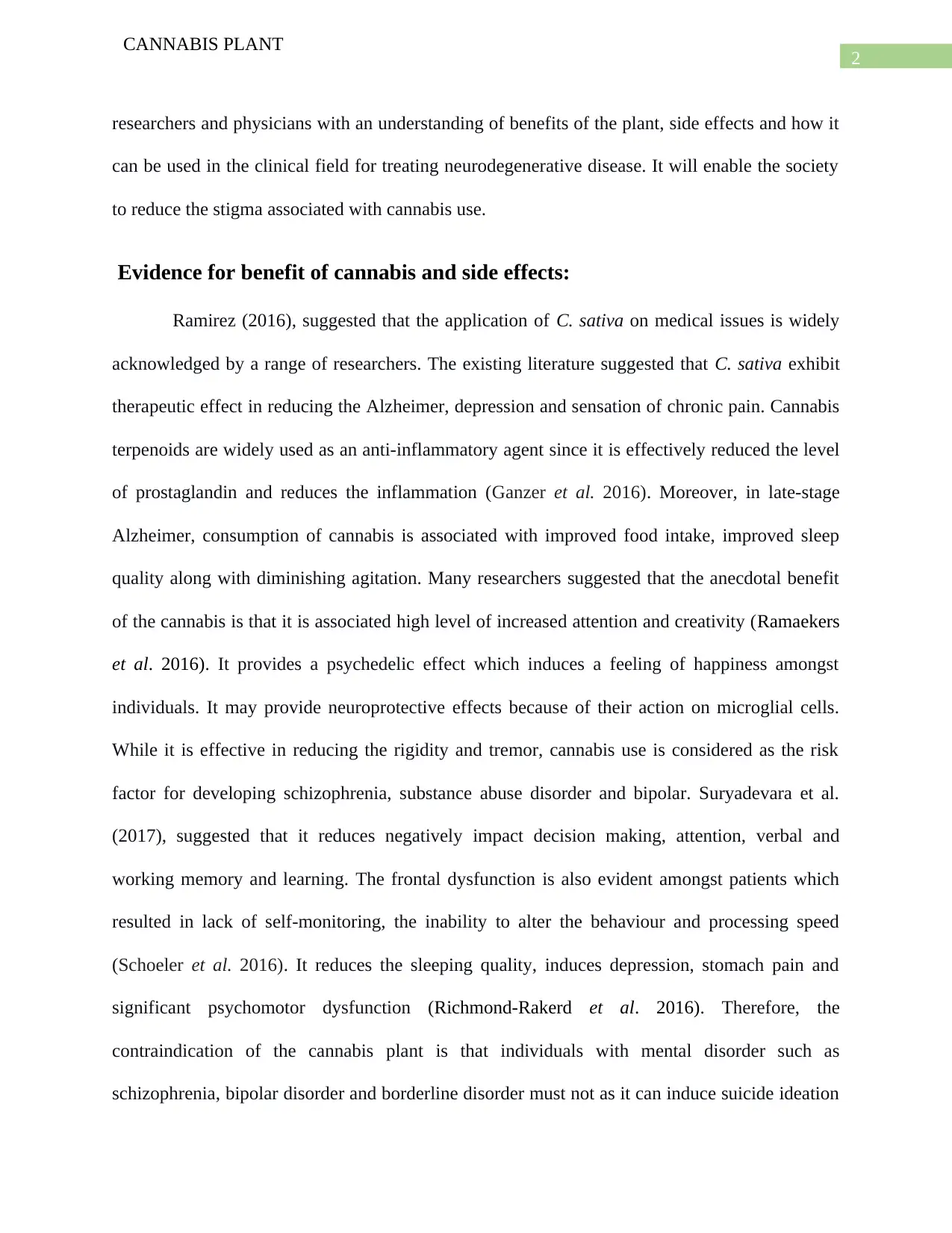
2
CANNABIS PLANT
researchers and physicians with an understanding of benefits of the plant, side effects and how it
can be used in the clinical field for treating neurodegenerative disease. It will enable the society
to reduce the stigma associated with cannabis use.
Evidence for benefit of cannabis and side effects:
Ramirez (2016), suggested that the application of C. sativa on medical issues is widely
acknowledged by a range of researchers. The existing literature suggested that C. sativa exhibit
therapeutic effect in reducing the Alzheimer, depression and sensation of chronic pain. Cannabis
terpenoids are widely used as an anti-inflammatory agent since it is effectively reduced the level
of prostaglandin and reduces the inflammation (Ganzer et al. 2016). Moreover, in late-stage
Alzheimer, consumption of cannabis is associated with improved food intake, improved sleep
quality along with diminishing agitation. Many researchers suggested that the anecdotal benefit
of the cannabis is that it is associated high level of increased attention and creativity (Ramaekers
et al. 2016). It provides a psychedelic effect which induces a feeling of happiness amongst
individuals. It may provide neuroprotective effects because of their action on microglial cells.
While it is effective in reducing the rigidity and tremor, cannabis use is considered as the risk
factor for developing schizophrenia, substance abuse disorder and bipolar. Suryadevara et al.
(2017), suggested that it reduces negatively impact decision making, attention, verbal and
working memory and learning. The frontal dysfunction is also evident amongst patients which
resulted in lack of self-monitoring, the inability to alter the behaviour and processing speed
(Schoeler et al. 2016). It reduces the sleeping quality, induces depression, stomach pain and
significant psychomotor dysfunction (Richmond-Rakerd et al. 2016). Therefore, the
contraindication of the cannabis plant is that individuals with mental disorder such as
schizophrenia, bipolar disorder and borderline disorder must not as it can induce suicide ideation
CANNABIS PLANT
researchers and physicians with an understanding of benefits of the plant, side effects and how it
can be used in the clinical field for treating neurodegenerative disease. It will enable the society
to reduce the stigma associated with cannabis use.
Evidence for benefit of cannabis and side effects:
Ramirez (2016), suggested that the application of C. sativa on medical issues is widely
acknowledged by a range of researchers. The existing literature suggested that C. sativa exhibit
therapeutic effect in reducing the Alzheimer, depression and sensation of chronic pain. Cannabis
terpenoids are widely used as an anti-inflammatory agent since it is effectively reduced the level
of prostaglandin and reduces the inflammation (Ganzer et al. 2016). Moreover, in late-stage
Alzheimer, consumption of cannabis is associated with improved food intake, improved sleep
quality along with diminishing agitation. Many researchers suggested that the anecdotal benefit
of the cannabis is that it is associated high level of increased attention and creativity (Ramaekers
et al. 2016). It provides a psychedelic effect which induces a feeling of happiness amongst
individuals. It may provide neuroprotective effects because of their action on microglial cells.
While it is effective in reducing the rigidity and tremor, cannabis use is considered as the risk
factor for developing schizophrenia, substance abuse disorder and bipolar. Suryadevara et al.
(2017), suggested that it reduces negatively impact decision making, attention, verbal and
working memory and learning. The frontal dysfunction is also evident amongst patients which
resulted in lack of self-monitoring, the inability to alter the behaviour and processing speed
(Schoeler et al. 2016). It reduces the sleeping quality, induces depression, stomach pain and
significant psychomotor dysfunction (Richmond-Rakerd et al. 2016). Therefore, the
contraindication of the cannabis plant is that individuals with mental disorder such as
schizophrenia, bipolar disorder and borderline disorder must not as it can induce suicide ideation
⊘ This is a preview!⊘
Do you want full access?
Subscribe today to unlock all pages.

Trusted by 1+ million students worldwide
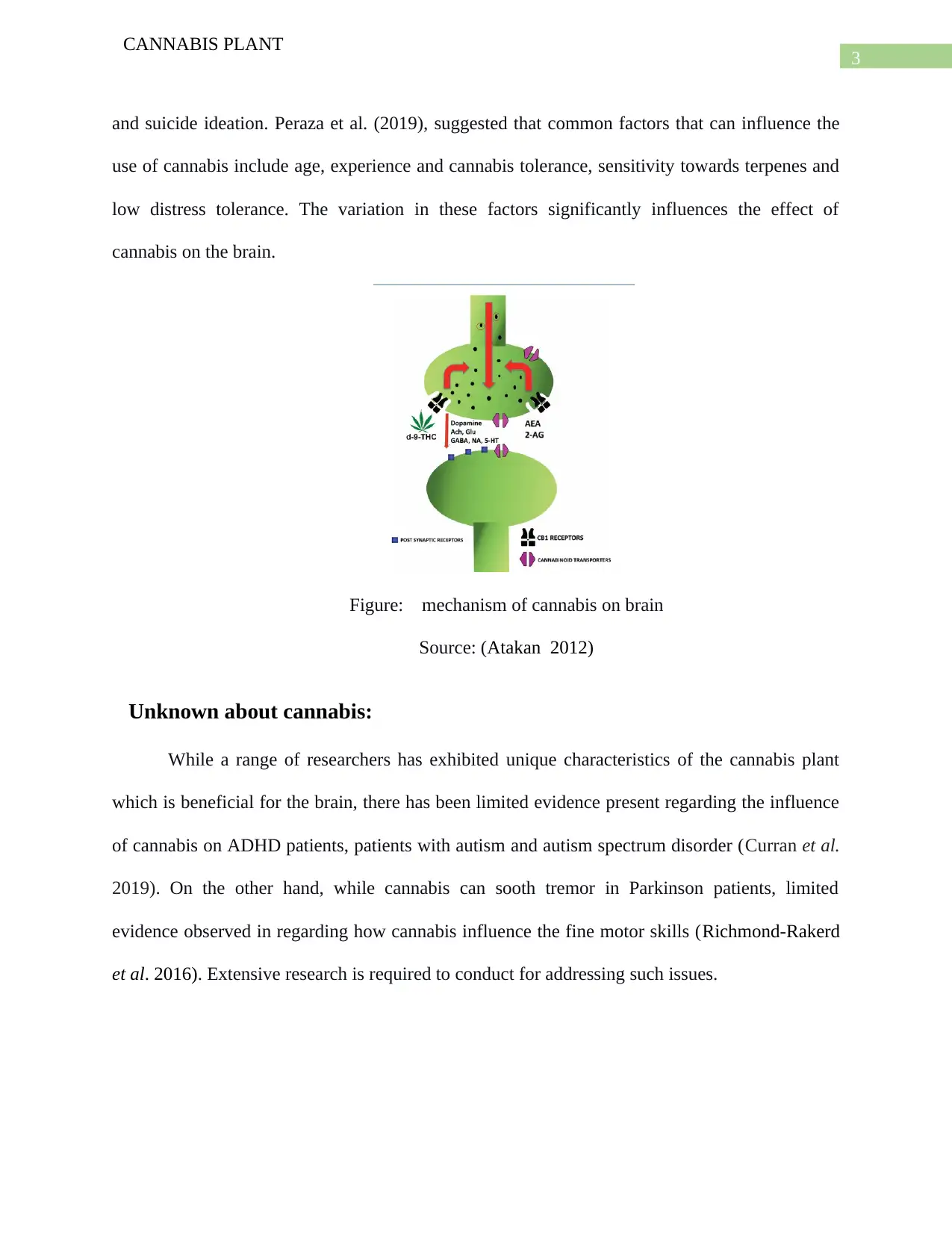
3
CANNABIS PLANT
and suicide ideation. Peraza et al. (2019), suggested that common factors that can influence the
use of cannabis include age, experience and cannabis tolerance, sensitivity towards terpenes and
low distress tolerance. The variation in these factors significantly influences the effect of
cannabis on the brain.
Figure: mechanism of cannabis on brain
Source: (Atakan 2012)
Unknown about cannabis:
While a range of researchers has exhibited unique characteristics of the cannabis plant
which is beneficial for the brain, there has been limited evidence present regarding the influence
of cannabis on ADHD patients, patients with autism and autism spectrum disorder (Curran et al.
2019). On the other hand, while cannabis can sooth tremor in Parkinson patients, limited
evidence observed in regarding how cannabis influence the fine motor skills (Richmond-Rakerd
et al. 2016). Extensive research is required to conduct for addressing such issues.
CANNABIS PLANT
and suicide ideation. Peraza et al. (2019), suggested that common factors that can influence the
use of cannabis include age, experience and cannabis tolerance, sensitivity towards terpenes and
low distress tolerance. The variation in these factors significantly influences the effect of
cannabis on the brain.
Figure: mechanism of cannabis on brain
Source: (Atakan 2012)
Unknown about cannabis:
While a range of researchers has exhibited unique characteristics of the cannabis plant
which is beneficial for the brain, there has been limited evidence present regarding the influence
of cannabis on ADHD patients, patients with autism and autism spectrum disorder (Curran et al.
2019). On the other hand, while cannabis can sooth tremor in Parkinson patients, limited
evidence observed in regarding how cannabis influence the fine motor skills (Richmond-Rakerd
et al. 2016). Extensive research is required to conduct for addressing such issues.
Paraphrase This Document
Need a fresh take? Get an instant paraphrase of this document with our AI Paraphraser
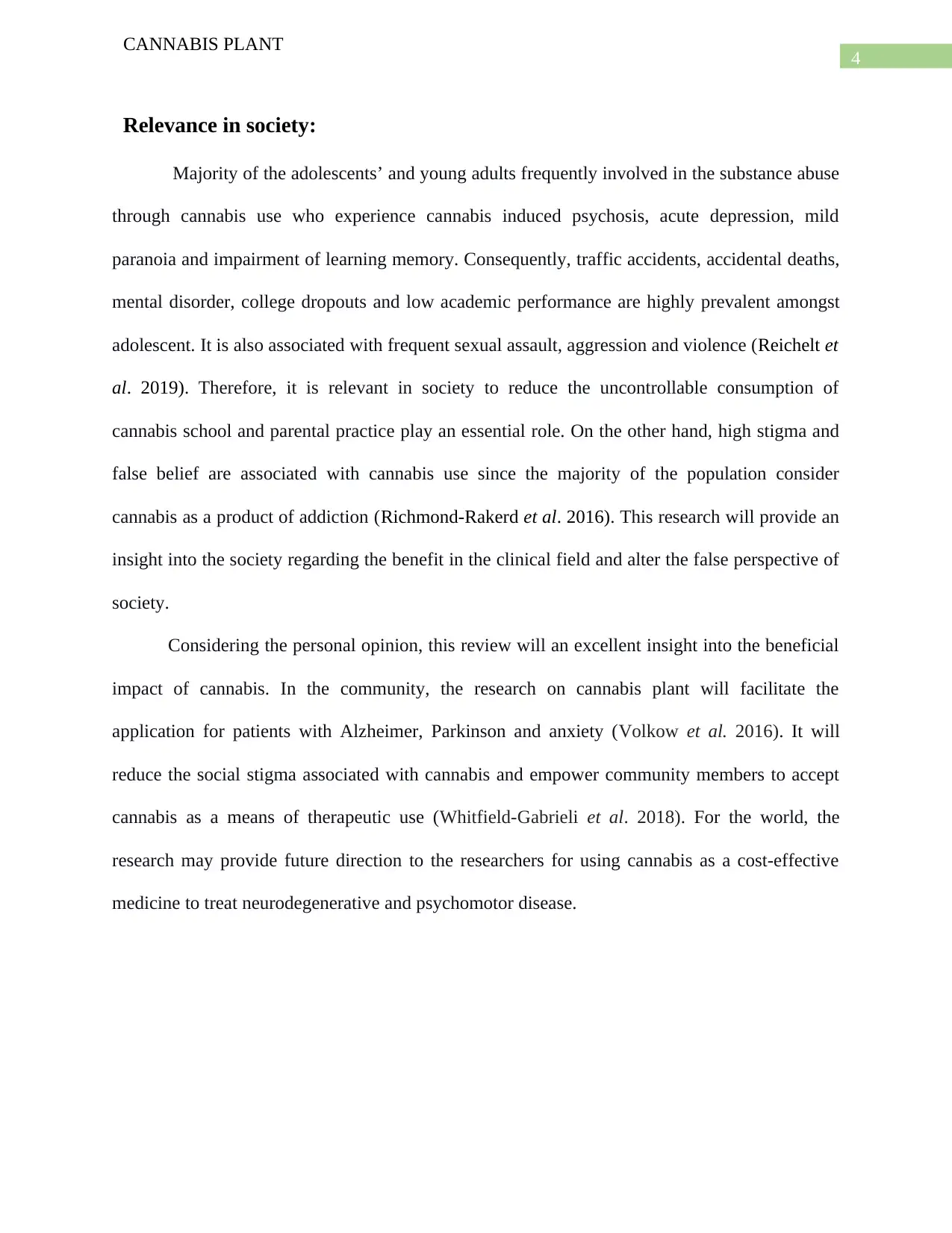
4
CANNABIS PLANT
Relevance in society:
Majority of the adolescents’ and young adults frequently involved in the substance abuse
through cannabis use who experience cannabis induced psychosis, acute depression, mild
paranoia and impairment of learning memory. Consequently, traffic accidents, accidental deaths,
mental disorder, college dropouts and low academic performance are highly prevalent amongst
adolescent. It is also associated with frequent sexual assault, aggression and violence (Reichelt et
al. 2019). Therefore, it is relevant in society to reduce the uncontrollable consumption of
cannabis school and parental practice play an essential role. On the other hand, high stigma and
false belief are associated with cannabis use since the majority of the population consider
cannabis as a product of addiction (Richmond-Rakerd et al. 2016). This research will provide an
insight into the society regarding the benefit in the clinical field and alter the false perspective of
society.
Considering the personal opinion, this review will an excellent insight into the beneficial
impact of cannabis. In the community, the research on cannabis plant will facilitate the
application for patients with Alzheimer, Parkinson and anxiety (Volkow et al. 2016). It will
reduce the social stigma associated with cannabis and empower community members to accept
cannabis as a means of therapeutic use (Whitfield-Gabrieli et al. 2018). For the world, the
research may provide future direction to the researchers for using cannabis as a cost-effective
medicine to treat neurodegenerative and psychomotor disease.
CANNABIS PLANT
Relevance in society:
Majority of the adolescents’ and young adults frequently involved in the substance abuse
through cannabis use who experience cannabis induced psychosis, acute depression, mild
paranoia and impairment of learning memory. Consequently, traffic accidents, accidental deaths,
mental disorder, college dropouts and low academic performance are highly prevalent amongst
adolescent. It is also associated with frequent sexual assault, aggression and violence (Reichelt et
al. 2019). Therefore, it is relevant in society to reduce the uncontrollable consumption of
cannabis school and parental practice play an essential role. On the other hand, high stigma and
false belief are associated with cannabis use since the majority of the population consider
cannabis as a product of addiction (Richmond-Rakerd et al. 2016). This research will provide an
insight into the society regarding the benefit in the clinical field and alter the false perspective of
society.
Considering the personal opinion, this review will an excellent insight into the beneficial
impact of cannabis. In the community, the research on cannabis plant will facilitate the
application for patients with Alzheimer, Parkinson and anxiety (Volkow et al. 2016). It will
reduce the social stigma associated with cannabis and empower community members to accept
cannabis as a means of therapeutic use (Whitfield-Gabrieli et al. 2018). For the world, the
research may provide future direction to the researchers for using cannabis as a cost-effective
medicine to treat neurodegenerative and psychomotor disease.
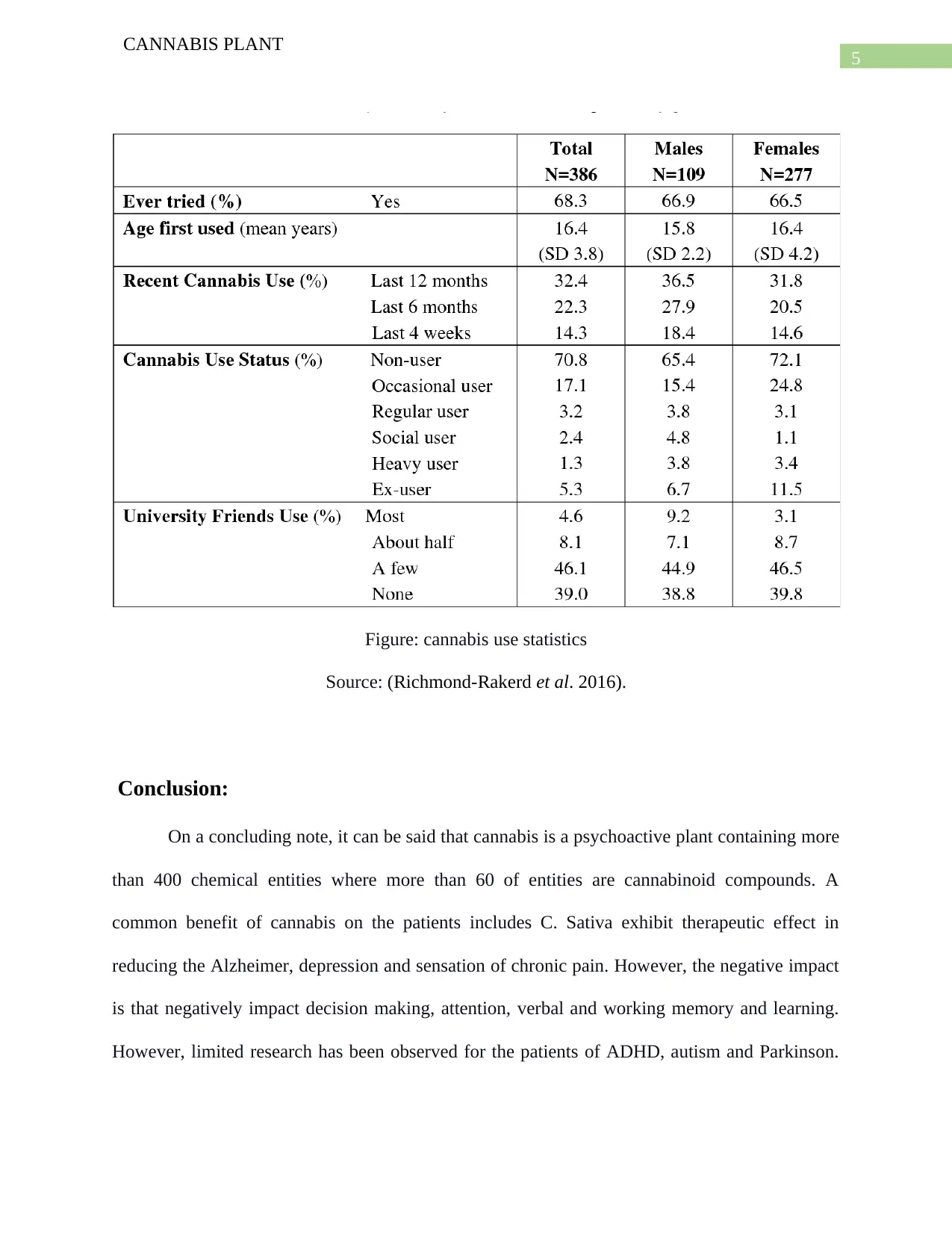
5
CANNABIS PLANT
Figure: cannabis use statistics
Source: (Richmond-Rakerd et al. 2016).
Conclusion:
On a concluding note, it can be said that cannabis is a psychoactive plant containing more
than 400 chemical entities where more than 60 of entities are cannabinoid compounds. A
common benefit of cannabis on the patients includes C. Sativa exhibit therapeutic effect in
reducing the Alzheimer, depression and sensation of chronic pain. However, the negative impact
is that negatively impact decision making, attention, verbal and working memory and learning.
However, limited research has been observed for the patients of ADHD, autism and Parkinson.
CANNABIS PLANT
Figure: cannabis use statistics
Source: (Richmond-Rakerd et al. 2016).
Conclusion:
On a concluding note, it can be said that cannabis is a psychoactive plant containing more
than 400 chemical entities where more than 60 of entities are cannabinoid compounds. A
common benefit of cannabis on the patients includes C. Sativa exhibit therapeutic effect in
reducing the Alzheimer, depression and sensation of chronic pain. However, the negative impact
is that negatively impact decision making, attention, verbal and working memory and learning.
However, limited research has been observed for the patients of ADHD, autism and Parkinson.
⊘ This is a preview!⊘
Do you want full access?
Subscribe today to unlock all pages.

Trusted by 1+ million students worldwide

6
CANNABIS PLANT
Therefore, the research on these diseases and how brain function altered for these patients may
open a new revenue of the research.
CANNABIS PLANT
Therefore, the research on these diseases and how brain function altered for these patients may
open a new revenue of the research.
Paraphrase This Document
Need a fresh take? Get an instant paraphrase of this document with our AI Paraphraser
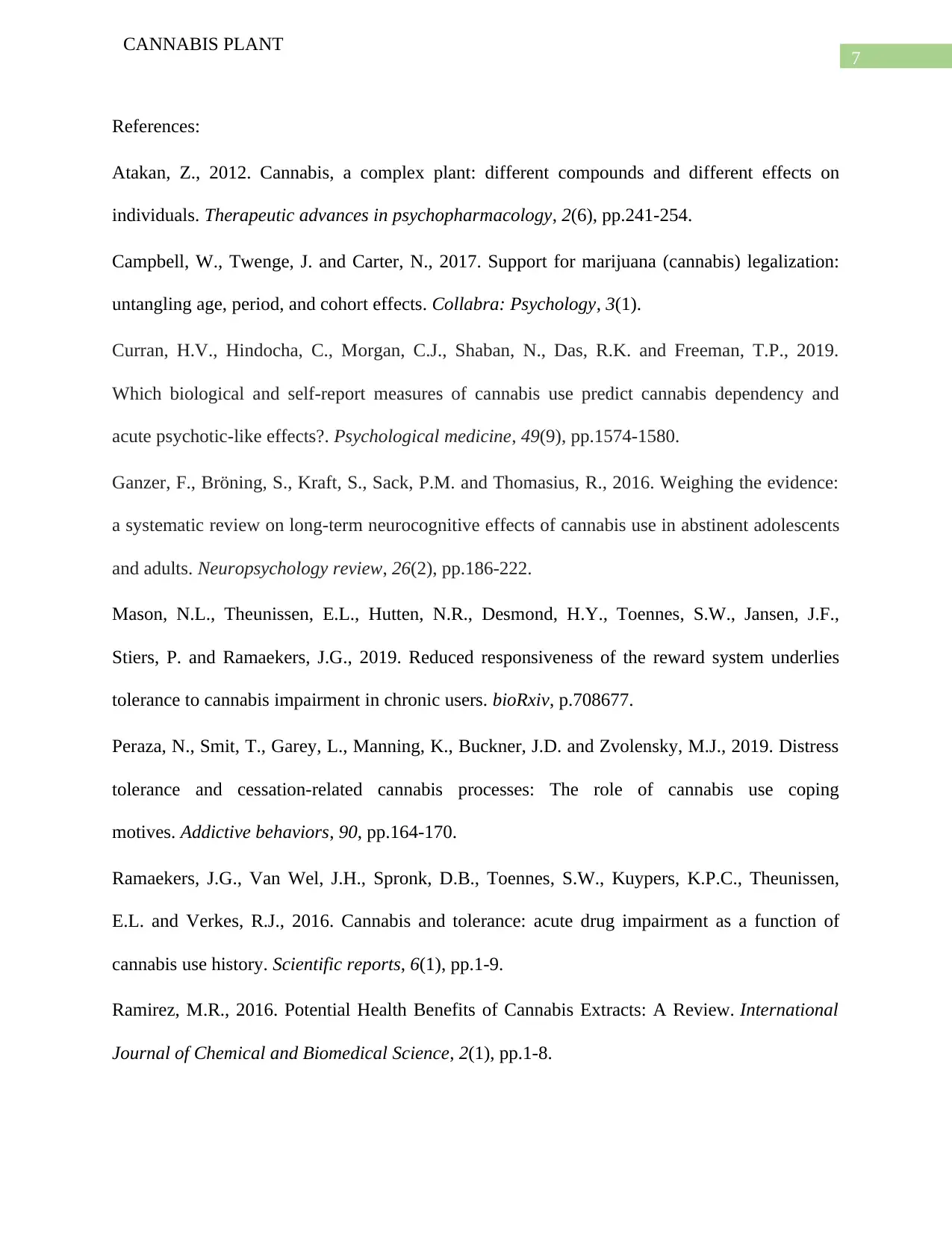
7
CANNABIS PLANT
References:
Atakan, Z., 2012. Cannabis, a complex plant: different compounds and different effects on
individuals. Therapeutic advances in psychopharmacology, 2(6), pp.241-254.
Campbell, W., Twenge, J. and Carter, N., 2017. Support for marijuana (cannabis) legalization:
untangling age, period, and cohort effects. Collabra: Psychology, 3(1).
Curran, H.V., Hindocha, C., Morgan, C.J., Shaban, N., Das, R.K. and Freeman, T.P., 2019.
Which biological and self-report measures of cannabis use predict cannabis dependency and
acute psychotic-like effects?. Psychological medicine, 49(9), pp.1574-1580.
Ganzer, F., Bröning, S., Kraft, S., Sack, P.M. and Thomasius, R., 2016. Weighing the evidence:
a systematic review on long-term neurocognitive effects of cannabis use in abstinent adolescents
and adults. Neuropsychology review, 26(2), pp.186-222.
Mason, N.L., Theunissen, E.L., Hutten, N.R., Desmond, H.Y., Toennes, S.W., Jansen, J.F.,
Stiers, P. and Ramaekers, J.G., 2019. Reduced responsiveness of the reward system underlies
tolerance to cannabis impairment in chronic users. bioRxiv, p.708677.
Peraza, N., Smit, T., Garey, L., Manning, K., Buckner, J.D. and Zvolensky, M.J., 2019. Distress
tolerance and cessation-related cannabis processes: The role of cannabis use coping
motives. Addictive behaviors, 90, pp.164-170.
Ramaekers, J.G., Van Wel, J.H., Spronk, D.B., Toennes, S.W., Kuypers, K.P.C., Theunissen,
E.L. and Verkes, R.J., 2016. Cannabis and tolerance: acute drug impairment as a function of
cannabis use history. Scientific reports, 6(1), pp.1-9.
Ramirez, M.R., 2016. Potential Health Benefits of Cannabis Extracts: A Review. International
Journal of Chemical and Biomedical Science, 2(1), pp.1-8.
CANNABIS PLANT
References:
Atakan, Z., 2012. Cannabis, a complex plant: different compounds and different effects on
individuals. Therapeutic advances in psychopharmacology, 2(6), pp.241-254.
Campbell, W., Twenge, J. and Carter, N., 2017. Support for marijuana (cannabis) legalization:
untangling age, period, and cohort effects. Collabra: Psychology, 3(1).
Curran, H.V., Hindocha, C., Morgan, C.J., Shaban, N., Das, R.K. and Freeman, T.P., 2019.
Which biological and self-report measures of cannabis use predict cannabis dependency and
acute psychotic-like effects?. Psychological medicine, 49(9), pp.1574-1580.
Ganzer, F., Bröning, S., Kraft, S., Sack, P.M. and Thomasius, R., 2016. Weighing the evidence:
a systematic review on long-term neurocognitive effects of cannabis use in abstinent adolescents
and adults. Neuropsychology review, 26(2), pp.186-222.
Mason, N.L., Theunissen, E.L., Hutten, N.R., Desmond, H.Y., Toennes, S.W., Jansen, J.F.,
Stiers, P. and Ramaekers, J.G., 2019. Reduced responsiveness of the reward system underlies
tolerance to cannabis impairment in chronic users. bioRxiv, p.708677.
Peraza, N., Smit, T., Garey, L., Manning, K., Buckner, J.D. and Zvolensky, M.J., 2019. Distress
tolerance and cessation-related cannabis processes: The role of cannabis use coping
motives. Addictive behaviors, 90, pp.164-170.
Ramaekers, J.G., Van Wel, J.H., Spronk, D.B., Toennes, S.W., Kuypers, K.P.C., Theunissen,
E.L. and Verkes, R.J., 2016. Cannabis and tolerance: acute drug impairment as a function of
cannabis use history. Scientific reports, 6(1), pp.1-9.
Ramirez, M.R., 2016. Potential Health Benefits of Cannabis Extracts: A Review. International
Journal of Chemical and Biomedical Science, 2(1), pp.1-8.
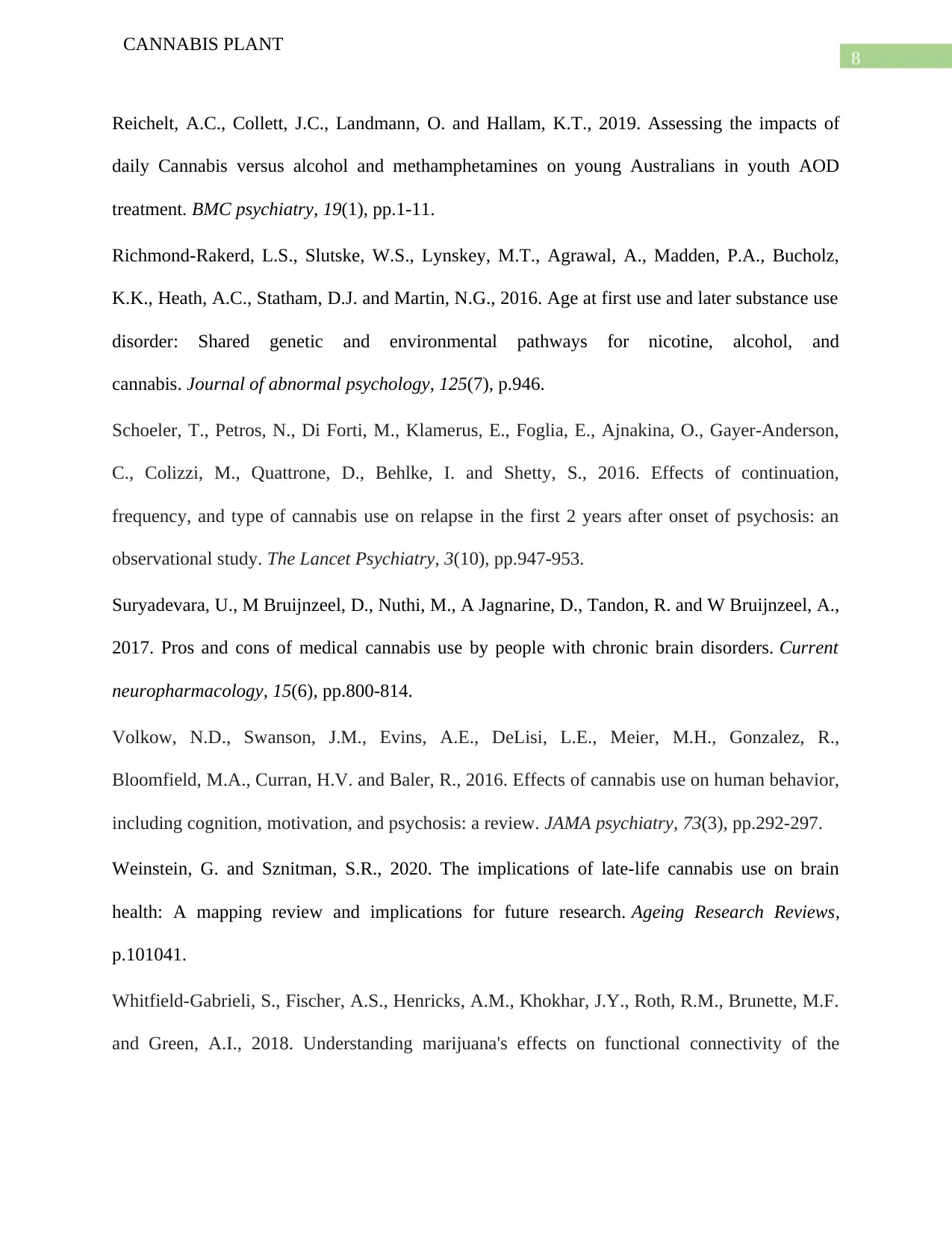
8
CANNABIS PLANT
Reichelt, A.C., Collett, J.C., Landmann, O. and Hallam, K.T., 2019. Assessing the impacts of
daily Cannabis versus alcohol and methamphetamines on young Australians in youth AOD
treatment. BMC psychiatry, 19(1), pp.1-11.
Richmond-Rakerd, L.S., Slutske, W.S., Lynskey, M.T., Agrawal, A., Madden, P.A., Bucholz,
K.K., Heath, A.C., Statham, D.J. and Martin, N.G., 2016. Age at first use and later substance use
disorder: Shared genetic and environmental pathways for nicotine, alcohol, and
cannabis. Journal of abnormal psychology, 125(7), p.946.
Schoeler, T., Petros, N., Di Forti, M., Klamerus, E., Foglia, E., Ajnakina, O., Gayer-Anderson,
C., Colizzi, M., Quattrone, D., Behlke, I. and Shetty, S., 2016. Effects of continuation,
frequency, and type of cannabis use on relapse in the first 2 years after onset of psychosis: an
observational study. The Lancet Psychiatry, 3(10), pp.947-953.
Suryadevara, U., M Bruijnzeel, D., Nuthi, M., A Jagnarine, D., Tandon, R. and W Bruijnzeel, A.,
2017. Pros and cons of medical cannabis use by people with chronic brain disorders. Current
neuropharmacology, 15(6), pp.800-814.
Volkow, N.D., Swanson, J.M., Evins, A.E., DeLisi, L.E., Meier, M.H., Gonzalez, R.,
Bloomfield, M.A., Curran, H.V. and Baler, R., 2016. Effects of cannabis use on human behavior,
including cognition, motivation, and psychosis: a review. JAMA psychiatry, 73(3), pp.292-297.
Weinstein, G. and Sznitman, S.R., 2020. The implications of late-life cannabis use on brain
health: A mapping review and implications for future research. Ageing Research Reviews,
p.101041.
Whitfield-Gabrieli, S., Fischer, A.S., Henricks, A.M., Khokhar, J.Y., Roth, R.M., Brunette, M.F.
and Green, A.I., 2018. Understanding marijuana's effects on functional connectivity of the
CANNABIS PLANT
Reichelt, A.C., Collett, J.C., Landmann, O. and Hallam, K.T., 2019. Assessing the impacts of
daily Cannabis versus alcohol and methamphetamines on young Australians in youth AOD
treatment. BMC psychiatry, 19(1), pp.1-11.
Richmond-Rakerd, L.S., Slutske, W.S., Lynskey, M.T., Agrawal, A., Madden, P.A., Bucholz,
K.K., Heath, A.C., Statham, D.J. and Martin, N.G., 2016. Age at first use and later substance use
disorder: Shared genetic and environmental pathways for nicotine, alcohol, and
cannabis. Journal of abnormal psychology, 125(7), p.946.
Schoeler, T., Petros, N., Di Forti, M., Klamerus, E., Foglia, E., Ajnakina, O., Gayer-Anderson,
C., Colizzi, M., Quattrone, D., Behlke, I. and Shetty, S., 2016. Effects of continuation,
frequency, and type of cannabis use on relapse in the first 2 years after onset of psychosis: an
observational study. The Lancet Psychiatry, 3(10), pp.947-953.
Suryadevara, U., M Bruijnzeel, D., Nuthi, M., A Jagnarine, D., Tandon, R. and W Bruijnzeel, A.,
2017. Pros and cons of medical cannabis use by people with chronic brain disorders. Current
neuropharmacology, 15(6), pp.800-814.
Volkow, N.D., Swanson, J.M., Evins, A.E., DeLisi, L.E., Meier, M.H., Gonzalez, R.,
Bloomfield, M.A., Curran, H.V. and Baler, R., 2016. Effects of cannabis use on human behavior,
including cognition, motivation, and psychosis: a review. JAMA psychiatry, 73(3), pp.292-297.
Weinstein, G. and Sznitman, S.R., 2020. The implications of late-life cannabis use on brain
health: A mapping review and implications for future research. Ageing Research Reviews,
p.101041.
Whitfield-Gabrieli, S., Fischer, A.S., Henricks, A.M., Khokhar, J.Y., Roth, R.M., Brunette, M.F.
and Green, A.I., 2018. Understanding marijuana's effects on functional connectivity of the
⊘ This is a preview!⊘
Do you want full access?
Subscribe today to unlock all pages.

Trusted by 1+ million students worldwide

9
CANNABIS PLANT
default mode network in patients with schizophrenia and co-occurring cannabis use disorder: A
pilot investigation. Schizophrenia research, 194, pp.70-77.
CANNABIS PLANT
default mode network in patients with schizophrenia and co-occurring cannabis use disorder: A
pilot investigation. Schizophrenia research, 194, pp.70-77.
1 out of 10
Related Documents
Your All-in-One AI-Powered Toolkit for Academic Success.
+13062052269
info@desklib.com
Available 24*7 on WhatsApp / Email
![[object Object]](/_next/static/media/star-bottom.7253800d.svg)
Unlock your academic potential
Copyright © 2020–2026 A2Z Services. All Rights Reserved. Developed and managed by ZUCOL.





